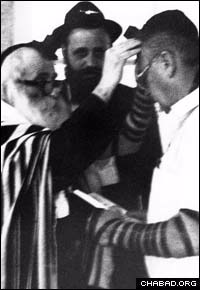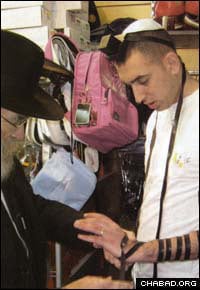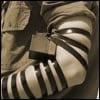One Thursday night in 1975, a group of Chasidic Jews who were crowded around a table in a small village outside of Tel Aviv decided to go out the next morning to distribute Shabbat candles and help Jews whom they had never met put on tefillin.
They drew their inspiration for such a bold task from Rabbi Mendel Futerfas, the one-time-businessman from Russia who led the farbrengen – or gathering where sharing words of Torah, meaningful stories and Chasidic melodies plays an integral part – in Kfar Chabad, Israel.
Known as Reb Mendel and born in 1887, Futerfas had, in his home country, invested all of his money to assist the underground network of Jewish day schools supported by Chabad-Lubavitch and was sent to jail for the subversion of Soviet edicts against religious observance. He made it to London in 1962, where five years later he took up the call of the Rebbe, Rabbi Menachem Mendel Schneerson, of righteous memory, for Jewish men everywhere to encourage other Jewish men to don tefillin.
In his broken English, he would go up to Jews on the street and tell them, "You Jew, I Jew. You tefillin, I tefillin." The approach worked, as many a soul was so taken aback at his eagerness, that they would respond to the request.
Futerfas moved to Kfar Chabad in 1972, where he served as a spiritual counselor to the students of the central Lubavitch yeshiva.
The day after the 1975 gathering, at 11:30 in the morning, four of the men, clad in hats and jackets, ventured out to the nearby city of Rishon Letziyon. Futerfas, leading the way, took up a position at the town's central taxi station. Rabbis Berel Kesselman and Yeshaya Gopin set themselves up near some stores, and Rabbi Sholom Feldman made the rounds of the rest of the commercial district's businesses, asking the owners if they would like to put on tefillin.
Feldman, who was the director of the printing press in Kfar Chabad's vocational school at the time, would learn quickly that the best time to pursue his route was around 2:00 in the afternoon, when most Israelis shunned shopping runs in favor of remaining indoors because of the intense heat. Now 74, the rabbi, joined by his son Dovid Feldman and grandson Itsik Feldman, continues to head out to the city week after week on his tefillin mission. He also distributes Shabbat candles.
Hundreds of yeshiva students also fan out every Friday to cities across Israel to carry out the Rebbe's instruction.

Sidney added that he sometimes feels like giving Feldman one of his products out of appreciation, but that the rabbi always demurs.
"He brings us matzah before Passover, he brings us Chanukah candles," said Sidney, "and he refuses to take anything. He does it with so much heart."
Feldman refused to speak about himself or of the influence he has had on those he's been visiting for more than 30 years. While his son told of those who light Shabbat candles every week after meeting his father, and of the many men who purchased their own pair of tefillin to wear more often than just once a week, Feldman preferred instead to focus the attention on his mentor, who died in 1995.
"It was very difficult for Reb Mendel to come every Friday," said Feldman. "It was very difficult for him to go in and out of the car. I asked him once, 'Why do you come every Friday? There are others that could come instead of you.'
" 'He told me: 'When I was a prisoner in the Soviet Union, they took away my tefillin. And though I tried to obtain tefillin, and at times I was successful, many times I did not have the opportunity to put [them on]. When I put on tefillin with other Jews in this country, where everyone is free [to practice religion], it repays back for the times I could not put them. It tells the Soviets that they were not successful in their mission."








Start a Discussion